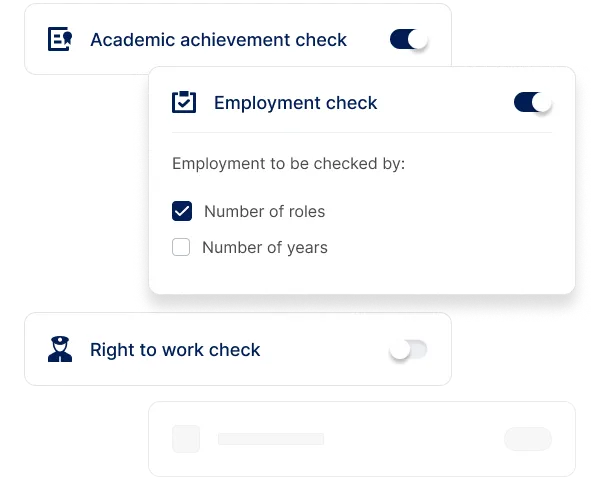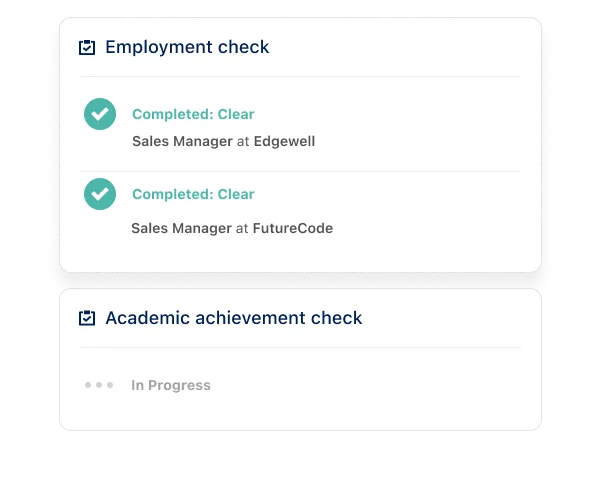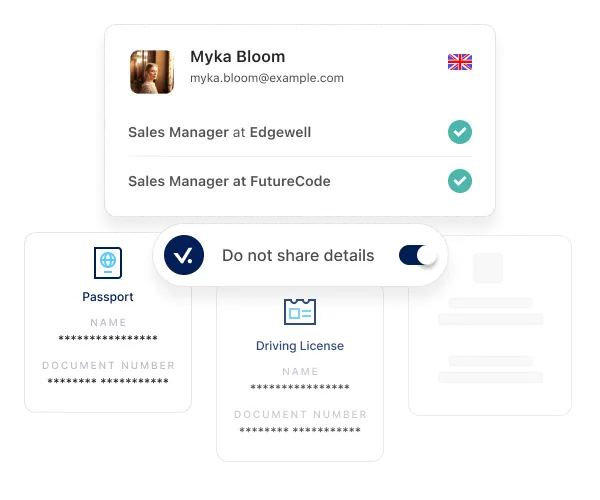Guide on Employment Background Checks in Malta
Everyday, Veremark carries out background screening all over the world for companies who need checked and verified employees. If you’re looking for background checks in Malta, here’s some information that might help.
Malta's Growing Economy and Workforce
Malta, a small island nation in the Mediterranean, has experienced significant economic growth over the past two decades. Positioned as a key player within the European Union, Malta has become a hub for industries such as finance, gaming, technology, and tourism. With its strong economy, modern infrastructure, and attractive business environment, Malta has successfully attracted foreign direct investment, and its workforce has become increasingly skilled and diverse.
The country is home to a well-educated, multilingual labor force, with many workers specializing in sectors like financial services, technology, and gaming. As Malta’s economy continues to grow, the demand for qualified professionals has surged, which in turn has led to an increased reliance on employment background checks. Companies in Malta recognize the importance of verifying candidates' credentials and ensuring that they are hiring trustworthy and qualified employees, especially in sectors with high regulatory requirements.
Legal Framework and Data Protection
The legal framework surrounding employment background checks in Malta is governed by both national laws and EU regulations, particularly in the areas of data protection. Employers must ensure that their background check practices comply with these legal frameworks to avoid legal consequences and protect candidates’ rights.
Key Legal Considerations:
- Data Protection Act (2018):Malta’s Data Protection Act, which aligns with the EU General Data Protection Regulation (GDPR), regulates how personal data should be collected, processed, and stored. This law applies to all organizations that process personal data of individuals in Malta, including employment background checks.
- Consent:The GDPR requires that employers obtain explicit and informed consent from candidates before conducting any background checks. Employers must clearly inform candidates about the scope of the checks and how their data will be processed. The consent must be voluntary, and candidates should have the option to withdraw their consent at any time.
- Relevance and Proportionality:According to the principles of GDPR, employers are obligated to ensure that any personal data collected is necessary, relevant, and limited to what is required for the recruitment process. Background checks must be proportional to the nature of the job role and should not involve excessive or irrelevant information.
- Retention of Data:Data collected during the background check process should not be stored for longer than necessary. Employers should establish clear retention policies, ensuring that candidate data is deleted or anonymized once the recruitment process is complete or when it is no longer needed.
- Special Categories of Data:The GDPR sets stricter rules for special categories of personal data, such as health information or criminal records. These records can only be processed under specific conditions and require additional safeguards. Employers should ensure they have a legal basis for processing such sensitive data.
- Employee Rights:Candidates have the right to access their personal data, including any information collected during the background check process. They also have the right to request corrections or erasure of inaccurate data. Employers should ensure that they respect these rights throughout the hiring process.
Common Background Checks in Malta
Employers in Malta conduct various types of background checks to verify the qualifications, experience, and integrity of job applicants. These checks are important for ensuring that candidates possess the necessary skills and are suitable for the role they are applying for.
A criminal record check is one of the most common background checks conducted in Malta, particularly for positions involving financial responsibility, public safety, or trust. Criminal background checks are typically performed by the Malta Police Force, which provides information on an individual’s criminal history.
Employers are required to obtain the candidate’s consent before requesting a criminal background check. These checks are especially crucial for sectors such as finance, healthcare, and education, where safeguarding is essential.

Verifying a candidate’s past employment is essential for ensuring that the applicant has the experience and qualifications they claim to possess. This check usually involves contacting previous employers to confirm job titles, dates of employment, and specific responsibilities.
In Malta, employers can rely on third-party verification services to perform these checks or do it directly by contacting past employers.

Education verification is crucial for positions that require specific academic qualifications or specialized skills. Employers often verify the candidate’s educational credentials by contacting schools, universities, or other academic institutions directly.
For roles in sectors like law, medicine, or engineering, verifying educational qualifications is a necessary step to ensure candidates meet the legal or professional standards required.

This type of check is used to ensure compliance with anti-money laundering (AML) laws and counter-terrorism financing regulations. Employers in Malta, especially in regulated sectors, routinely conduct these checks to ensure that candidates do not have connections with criminal or unethical activities.

Credit history checks are increasingly being used, particularly in the financial services sector, for roles involving financial responsibility or decision-making. A credit report helps employers assess the financial stability and integrity of candidates.
While less common for other sectors, credit checks are crucial for positions in banking, finance, and accounting, where managing company assets and resources is integral to the job.


Seamless integration with existing hiring software
Plug our award-winning background screening software into your existing hiring workflows with Veremark's super-fast RESTful API.
Industries Benefiting from Background ChecksPrivacy and Data Security
Given the strict regulations around data protection in Malta, employers must be particularly cautious about how they handle candidate data during the background check process. Safeguarding privacy and ensuring data security is paramount to maintaining trust and compliance with the law.
Key Privacy Considerations:
- Data Minimization:Employers should collect only the personal data that is necessary for the recruitment process. Background checks should be focused on verifying the qualifications and suitability of candidates for the role they are applying for. Collecting excessive or irrelevant data can expose employers to legal risks.
- Data Security:Employers must take appropriate measures to secure personal data collected during background checks. This includes storing data in encrypted formats, restricting access to authorized personnel only, and ensuring that data is securely deleted when no longer required.
- Transparency and Consent:Transparency is a critical aspect of privacy. Candidates must be fully informed about what data is being collected and how it will be used. Consent forms should clearly outline the scope of the background checks, and candidates should have the right to withdraw their consent at any time.
- Right to Access:Candidates have the right to access their personal data held by employers. If a candidate requests access, employers must provide a copy of the data held about them within a reasonable time frame. This promotes transparency and helps ensure that candidates' rights are respected.
Turnaround times
Industries Benefiting from Background Checks
Financial Services
The financial sector in Malta is highly regulated, and as such, background checks are essential for hiring staff in banks, insurance companies, and other financial institutions. Criminal background checks, global watchlist screenings, and credit history checks are routine in this sector to ensure compliance with anti-money laundering (AML) and counter-terrorism financing (CTF) regulations.
Gaming and iGaming
Malta is a hub for the gaming and iGaming industries, with many online casinos and betting companies based on the island. These companies require thorough background checks on employees, particularly those in management or finance roles, to prevent fraud and ensure that staff comply with both local and international gaming regulations.
Healthcare
In the healthcare sector, background checks are essential to ensure that professionals such as doctors, nurses, and other medical staff have the appropriate qualifications and a clean criminal record. Given the sensitivity of patient data and the need to protect vulnerable individuals, healthcare institutions routinely verify educational qualifications and criminal backgrounds.
Education
Educational institutions, both public and private, perform background checks on teachers and administrative staff. Verifying academic credentials and criminal records is especially important for roles that involve working with minors.
Technology
As Malta’s technology sector continues to grow, particularly in software development and cybersecurity, background checks on candidates are essential to protect sensitive data and intellectual property. Employers often verify technical skills, past employment, and criminal records to safeguard their operations.
Best Practices for Employers
To ensure effective and legal background checks, employers in Malta should follow best practices that respect privacy laws, promote transparency, and protect both the company and its candidates.
Best Practices:
- Create a Clear Background Check Policy: Establish a formal, transparent policy for background checks, detailing which checks will be performed, the consent process, and how data will be handled. This ensures consistency and compliance with legal requirements.
- Obtain Explicit Consent: Always obtain explicit, informed consent from candidates before conducting any background checks. This ensures that the process complies with data protection laws.
- Limit the Scope of Checks: Ensure that background checks are relevant to the role and that data collection is limited to what is necessary. For instance, only collect criminal or financial data if it is pertinent to the job responsibilities.
- Secure Candidate Data: Implement strong data security measures to protect candidates’ personal information. Encrypt sensitive data and ensure that it is only accessible to authorized personnel.
- Ensure Transparency: Keep candidates informed throughout the background check process. Provide them with clear information about their rights and the types of data being collected.
- Comply with Legal Requirements: Ensure that all background checks comply with local laws, including the Data Protection Act and GDPR. This minimizes legal risks and fosters trust with candidates.
How it works




Data protection by design
Vault-like security with ISO and SOC2 certification
Employment background checks in Malta play an important role in ensuring that employers hire qualified, trustworthy candidates. With the country’s growing economy and its position as a hub for industries such as finance, gaming, and technology, the demand for comprehensive background checks is on the rise. Employers must navigate the complex legal landscape of data protection, ensure compliance with privacy laws, and adopt best practices in order to carry out background checks effectively. By doing so, they protect their businesses and maintain the integrity of the hiring process, while also respecting candidates’ privacy rights.
Read more
FAQs
This depends on the industry and type of role you are recruiting for. To determine whether you need reference checks, identity checks, bankruptcy checks, civil background checks, credit checks for employment or any of the other background checks we offer, chat to our team of dedicated account managers.
Many industries have compliance-related employment check requirements. And even if your industry doesn’t, remember that your staff have access to assets and data that must be protected. When you employ a new staff member you need to be certain that they have the best interests of your business at heart. Carrying out comprehensive background checking helps mitigate risk and ensures a safer hiring decision.
Again, this depends on the type of checks you need. Simple identity checks can be carried out in as little as a few hours but a worldwide criminal background check for instance might take several weeks. A simple pre-employment check package takes around a week. Our account managers are specialists and can provide detailed information into which checks you need and how long they will take.
All Veremark checks are carried out online and digitally. This eliminates the need to collect, store and manage paper documents and information making the process faster, more efficient and ensures complete safety of candidate data and documents.
In a competitive marketplace, making the right hiring decisions is key to the success of your company. Employment background checks enables you to understand more about your candidates before making crucial decisions which can have either beneficial or catastrophic effects on your business.
Background checks not only provide useful insights into a candidate’s work history, skills and education, but they can also offer richer detail into someone’s personality and character traits. This gives you a huge advantage when considering who to hire. Background checking also ensures that candidates are legally allowed to carry out certain roles, failed criminal and credit checks could prevent them from working with vulnerable people or in a financial function.
Transform your hiring process
Request a discovery session with one of our background screening experts today.



%20(1)%20(2)%20(2)%20(1).jpg)
%20(1).webp)
